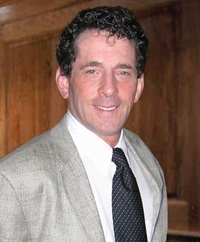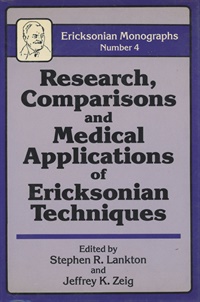Ericksonian Monographs 04 - Research, Comparisons and Medical Applications of Ericksonian Techniques (Hardcover)
- Average Rating:
- Not yet rated
- Topic Areas:
- Ericksonian Hypnosis and Therapy Techniques | Milton Erickson | Research
- Author:
- Jeffrey Zeig, PhD | Stephen Lankton, MSW
- Copyright:
-
1988
- Number of Pages:
- 118
- License:
- Never Expires.
Tags: Ericksonian Monographs
Description
Description:
Book is used, but in good condition.
This is the fourth volume in the widely hailed series of Ericksonian Monographs sponsored by the Milton H. Erickson Foundation as part of its expanding educational forum for mental health professionals.
The Ericksonian Monographs make available original work - theory, clinical technique, case material, and research - on the cutting edge of Ericksonian thought and practice.
Ericksonian Monographs No. 4 presents a richly stimulating collection of articles which deal with three extremely important areas of development in Ericksonian work: research, integration within the practice of other therapies, and medical applications.
The first section focuses on varied research models that are especially useful to the therapist. Jean Godin discusses evocation and indirect suggestion in the communication patterns of Erickson, while Michael B. Murphy takes a linguistic structural approach to indirect suggestion.
Of unusual interest is the article by Haim Omer and colleagues which describes the use of standardized hypnotic-relaxation cassettes in a gynecologic-obstetric ward. Based on data taken from seminar participants, Harriet E. Hollander and associates examine the important question of whether hypnosis is an innate ability or a learned skill.
The second section offers effective ways of integrating Ericksonian approaches with other popular therapeutic methods. Jeffrey B. Feldman's article compares and contrasts Ericksonian and cognitive therapies, while Maggie Phillips shows how Erickson's approach may be used to enhance the Gouldings' redecision therapy.
The final section on medical applications demonstrates that hypnotic-related therapy can be effectively used within a medical setting. Steven Goldsmith provides practical Ericksonian techniques for dealing with the problem of getting patients to follow instructions on taking medication. Juliet Auer illustrates how Ericksonian hypnosis and psychotherapy can be used even in a crowded and crisis filled emergency room. Finally, Bob Britchford describes the effective use of a ten-minute trance in a busy general medical practice.
While the aim of the Ericksonian Monographs is to reflect the growing influence and applications of the work of Milton H. Erickson, it must be remembered that Erickson himself disapproved of schools of therapy, believing that any school focuses on its own delimiting approaches as the "right" way and excludes others as the "wrong" way to do therapy. He felt that the individuality of the patient and of the therapist is foremost and emphasized that psychotherapy should be formulated to meet the uniqueness of the individual's needs.
It is this spirit of intellectual freedom that inspires the Ericksonian Monographs as a vehicle that will contribute to the comprehensive and practice of effective therapy by therapists of many different theoretical schools.
Credits
Author

Jeffrey Zeig, PhD Related Seminars and Products
Jeffrey K. Zeig, PhD, is the Founder and Director of the Milton H. Erickson Foundation and is president of Zeig, Tucker & Theisen, Inc., publishers in the behavioral sciences. He has edited, co-edited, authored or coauthored more than 20 books on psychotherapy that appear in twelve foreign languages. Dr. Zeig is a psychologist and marriage and family therapist in private practice in Phoenix, Arizona.

Stephen Lankton, MSW Related Seminars and Products
Stephen R. Lankton, MSW, is a Licensed Clinical Social Worker (LCSW) in Phoenix, Arizona. In addition to his extensive training in Gestalt Therapy, and Transactional Analysis, he studied regularly with Milton H. Erickson, M. D. from July 1975 through December 1979. He is the Editor-in-Chief of the American Journal of Clinical Hypnosis (since 2005) and a Life-Fellow of the American Society of Clinical Hypnosis (ASCH). He has maintained a private psychotherapy practice and trained therapists worldwide for five decades.
He is a Diplomate in Clinical Hypnosis, an Emeritus Clinical Member of the International Transactional Analysis Association (ITAA), and Past-President of the American Hypnosis Board for Clinical Social Work. He is on the teaching faculty of the Milton H. Erickson Foundation.
Steve has received two Lifetime Achievement Awards: the “Lifetime Achievement Award for Outstanding Contribution to the Field of Psychotherapy” from the Milton H. Erickson Foundation, and the “Lifetime Achievement Award for Contributions to The Field of Hypnosis” from the American Society of Clinical Hypnosis.
He served as Faculty Associate at Arizona State University (ASU) 2004-2008 and the ASU Graduate School of Social Work 2011- 2018 and was appointed by the Governor to the Arizona Board of Behavior Health Examiners where he served from 2009-2016 and was the Board Chairperson from 2014 to 2016.
He authored, co-authored, or edited 20 books on psychotherapy and hypnosis with translations in seven languages and over 68 chapters and peer reviewed articles including The Answer Within, and Tools of Intention and the recent “Chapter 8: States of Consciousness Model and Ericksonian Approaches to Hypnosis” in the Routledge International Handbook of Clinical Hypnosis.


